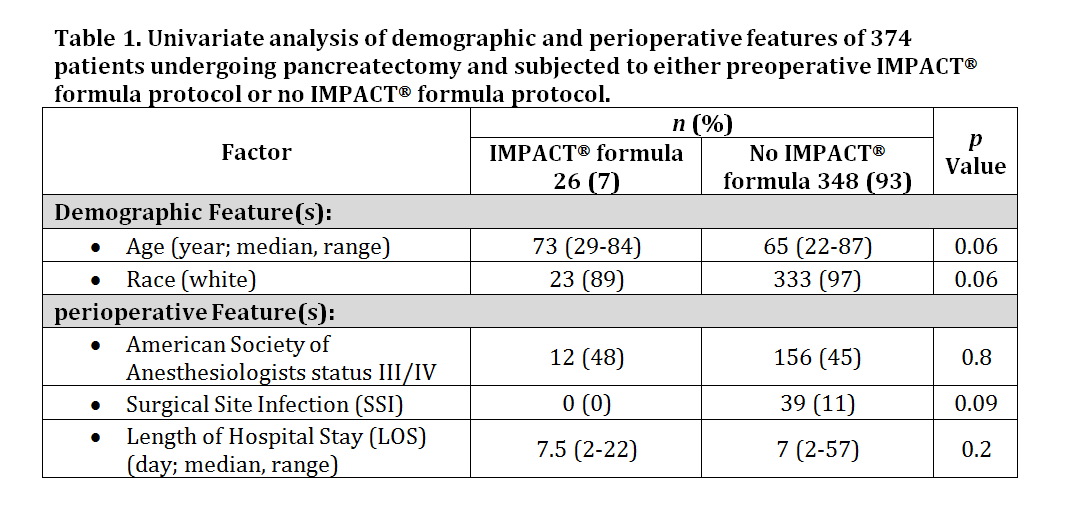K. N. Dautermann1, T. L. Schmotzer1, M. Henry1, A. I. Salem1, E. R. Winslow1, C. S. Cho1, S. M. Weber1 1University Of Wisconsin School Of Medicine And Public Health,Department Of Surgery,Madison, WI, USA
Introduction:
IMPACT® is an immunonutrition formula containing a unique blend of three synergistic immunonutrients of arginine, dietary nucleotides and omega-3 fatty acids. These factors are believed to play a major role in promoting T-lymphocyte growth and replication, modulating cytokines to produce less inflammatory and immunosuppressive mediators, and providing a source of purine and pyrimidine bases for DNA/RNA production. We sought to evaluate outcomes associated with utilizing enteral IMPACT® for patients undergoing pancreatectomies.
Methods:
Retrospectively collected data on pancreatectomy patients who received IMPACT® preoperatively for 5 days (3 cans/d) was analyzed and compared to pancreatectomy cases in our institutional NSQIP database who did not receive IMPACT®. Data collection included demographics, American Society of Anesthesiologists (ASA) status, rates of 30-day postoperative surgical site infection (SSI) and length of hospital stay (LOS). IMPACT® patients without NSQIP data had data on postoperative complications validated from chart reviews using NSQIP definitions. Outcomes were compared between groups.
Results:
A total of 26 patients who received IMPACT® were evaluated and compared to 348 patients who did not receive the formula. There was no difference in gender distribution (p=0.07), race (p=0.06), median age (0.06) or ASA status (p=0.8) between groups. On univariable analysis, there was no difference between rates of postoperative 30-day SSI in the IMPACT® group (0% vs 11%, p=0.09) or median LOS (7.5 (2-22) days vs 7 (2-57) days, p=0.2) (Table 1). A separate multivariable analysis adjusting for age and gender was performed and there was no association between IMPACT® and SSI (OR=0.15, p=0.19, CI=0.009-2.56) or LOS (p=0.08).
Conclusion:
There was no difference in 30-day postoperative surgical site infection or length of hospital stay between the groups. This is in contrast to previous reports describing decreased rates of postoperative surgical site infection and shorter LOS associated with the utilization of enteral immunonutrition formulas. Further evaluation with larger numbers of patients are required to better assess the role of enteric immunonutrition formulas in modifying short term postoperative surgical outcome after major surgeries.
